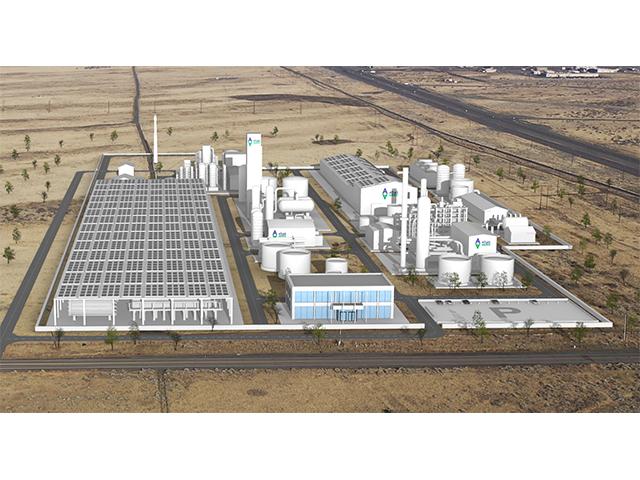Zero-Carbon Ammonia Fertilizer
Startup Fertilizer Company Atlas Agro Seeks to Disrupt Industry With Carbon-Free Project
RICHLAND, Wash. (DTN) -- A startup fertilizer company touting that its mission will "disrupt" the fertilizer industry is proposing a $1 billion fertilizer plant in southeastern Washington state that the company states will make "zero-carbon" ammonia.
The project is one of the first looking at technology to produce low-carbon nitrogen fertilizers.
Atlas Agro, based in Switzerland, was started in 2021 by former executives in the fertilizer industry. The company has announced plans to build its first fertilizer plant in Richland, Washington. The company cites, "Atlas Agro disrupts an industry that accounts for (roughly) 2% of the world's (carbon dioxide) emissions."
Atlas Agro announced last week the company had signed a memorandum of understanding with KBR to license KBR's technology for its project. KBR stated the engineering firm will provide design, proprietary equipment and catalyst for the plant.
"We are excited to support Atlas Agro's vision of zero-carbon fertilizer production through our market-leading green ammonia technology, K-GreeN," said Doug Kelly, KBR's president of its Technology Division. "We are also confident that we can drive schedule synergies across the series of plants to accelerate availability of clean ammonia globally."
Petter Ostbo, CEO of Atlas Agro, said, "Each of our green ammonia plants will produce fertilizer that will help feed nearly 16 million people and avoid global carbon emissions of more than 1 million tons per year."
Atlas Agro also announced last week that the company had reached an agreement to buy 150 acres for $9.1 million in the Port of Benton, a technology economic development hub in Richland.
Along with buying the land and signing the MOU with KBR, Atlas Agro announced it has signed an agreement for an engineering study by Tecnicas Reunidas, an engineering contractor. Atlas Agro noted the study will "inform a potential final investment decision."
P[L1] D[0x0] M[300x250] OOP[F] ADUNIT[] T[]
"Today's announcements reflect major momentum toward Atlas Agro's goal supplying locally produced, green fertilizers that can support farmers and help decarbonize the Pacific Northwest's agriculture economy," said Atlas Agro North American Executive Director Dan Holmes. "As we advance the Richland project one step closer to a final investment decision, we couldn't ask for better partners in developing a domestic supply of zero-carbon nitrate fertilizer."
Atlas states the company will use electrolyzers to produce hydrogen and then ammonia using Haber-Bosch synthesis to make calcium ammonium nitrate. "This is a proven process that has existed for decades. However, Atlas Agro's proprietary process improvements, coupled with supportive state and federal policies, have positioned the company to build and operate the Richland facility on a cost-competitive level with gas- or coal-based nitrogen fertilizer imports."
Asked about specific state and federal policies, a spokesman for Atlas Agro cited Washington state's Clean Energy Transformation Act and the Climate Commitment Act, "both of which are accelerating deep decarbonization efforts and a clean energy transition." At the federal level, provisions included in both the Inflation Reduction Act and the Infrastructure Investment and Jobs Act have also accelerated the development of the nation's green hydrogen economy, making America one of the most competitive global markets for Atlas Agro's project development.
Holmes and Atlas Agro's government affairs representative -- a former chief of staff for Oregon's governor -- declined requests for interviews from DTN.
In its news release detailing the land purchase, Atlas Agro included comments from Washington political leaders championing the project.
"Washington welcomes Atlas Agro and is excited to watch it develop the world's first commercial-scale green fertilizer plant," Washington Gov. Jay Inslee, a Democrat, said in a statement. "This is a meaningful example of what's possible as we build a clean, green hydrogen sector in our state and seize the economic opportunities of a zero-carbon future."
Sen. Patty Murray, also a Democrat, said Atlas Agro's project "is going to be a game changer for farmers across Washington state and the entire Pacific Northwest." Along with the jobs, Murray added the project would "help drive down input costs." She added, "Washington state has been a leader in sustainable agriculture, and as Senate Appropriations chair, I'm going to keep working to build on this kind of progress by expanding our investments in climate action and support for our farmers."
Power will remain a major issue for Atlas Agro going forward. The company has told Richland officials that the fertilizer plant could require as much as 350 megawatts of power, which is roughly the equivalent power that the city uses annually.
A spokesman for Atlas Agro stated, "The Pacific Northwest attracted Atlas Agro due to its competitive landscape for renewables development. The Atlas Agro team is pursuing an all-of-the-above strategy that considers the significant number of existing and emerging renewable generation sources within the region."
SEARCH FOR LOWER EMISSIONS IN FERTILIZER
Atlas Agro isn't the only company looking at ways to produce low-carbon ammonia. Earlier this month, Yara Clean Ammonia and Enbridge Inc. announced a letter of intent to develop and construct a "low-carbon blue ammonia production facility."
Yara and Enbridge stated their project would capture and store approximately 95% of the carbon dioxide in the potential plant. The two companies expected their plant project could cost between $2.6 billion to $2.9 billion with production sometime in 2027 or 2028.
Exxon Mobil also earlier this year announced an engineering study for a low-carbon hydrogen and ammonia facility for a project in Texas. Like the Yara project, Exxon Mobile cited that more than 98% of the carbon dioxide from the facility will be captured and stored as well.
Atlas Agro will not rely on carbon storage meet its "zero-carbon" emission claims because "the project has no carbon to sequester," a spokesman stated.
Also see "DTN Retail Fertilizer Trends" here: https://www.dtnpf.com/….
Chris Clayton can be reached at Chris.Clayton@dtn.com
Follow him on Twitter @ChrisClaytonDTN
(c) Copyright 2023 DTN, LLC. All rights reserved.





